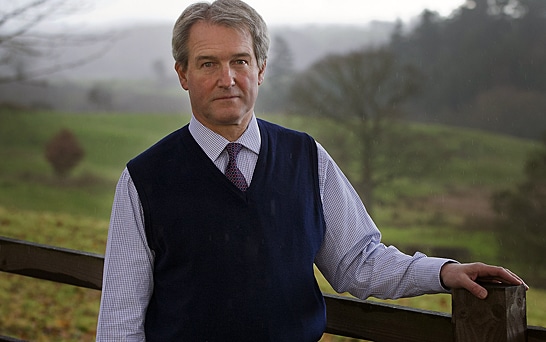A group calling themselves the ‘ecomodernists’ were warned not to make their British debut alongside prominent UK climate denier Owen Paterson.
But the American-based Breakthrough Institute think tank behind the group dismissed this advice with a swift “f@*% you”.
Breakthrough launched their Ecomodernism manifesto in London on the morning of September 24, arguing that through science, technology and development, human impacts on the natural world can be decoupled from economic activity.
The launch was hosted by UK2020, a think tank set up by Paterson. Also speaking at the event was climate ‘lukewarmist’ and coal mine owner Matt Ridley. This was a mistake, the group was later told.
“We considered very much not going to Owen Paterson’s press conference [Thursday] morning,” Michael Shellenberger, Breakthrough Institute president and co-founder, told an audience that evening following criticism of the decision.
“We talked about it, you know, everybody told us not to go, ‘Don’t go to the press conference, he’s going to co-opt ecomodernism, he’s going to use you’. And we just said ‘Fuck you all, we’re going to go to the press conference’.”
He continued: “Owen will say his thing, we’re going to say our thing, if people can’t deal with it, fuck ‘em. I’m done with the tribalism on this.”
#EcoModernism @_UK2020 with @mark_lynas @MichaelBTI @TedNordhaus @mattwridley http://t.co/rbhucYBx43 pic.twitter.com/LGGTaIryys
— Owen Paterson MP (@Owen_PatersonMP) September 24, 2015
Wrong Decision
However, multiple audience members said this was the wrong approach for a new environmentally-focused group trying to gain legitimacy in Europe.
Tom Heap, a freelancer for the BBC in the audience on Thursday evening, bluntly said: “You were wrong, you shouldn’t have gone. You ended up being captured by the Right today.”
This was highlighted by the fact that, ahead of the UK2020 press conference, Paterson appeared on BBC Radio 4’s Today programme to promote ecomodernism.
But as Greenpeace UK’s chief scientific advisor, Doug Parr, also on the programme, aptly put it: “I’m not taking lessons on listening to science from a former Secretary of State who didn’t take briefings from the Met Office on climate change.”
So it’s easy to see how Paterson may quickly become the face of European ecomodernism – especially as he plans to promote bio-tech as the solution to the developing countries’ agriculture problems at the Conservative party conference the first week of October.
Dustin Benton, head of energy and resources at Green Alliance told Shellenberger: “It was a bit of a mistake to get Owen Paterson as the visible token guy of your movement.”
In an attempt to distance himself from Paterson, while at the same time leaving the door open labelling ecomodernism as a “golden bridge” to unite the political left and right, Shellenberger said: “Is Owen Paterson going to embrace an affirmative agenda? I don’t know, but if he doesn’t, it’s not ecomodernism, he’s not going to be able to call it that and no one will believe him if he does. If he does do it, then wouldn’t we all be happier for that?”
But as panel member Bryony Worthington, Labour shadow energy minister, explained: “The problem is, you can carry this kind of association that you are defined by your opposition to the environment movement rather than your pro. So when you do something like this with someone like Paterson who is definitely anti-environmentalism, you associated yourself immediately [with that] then by defining yourself in the negative.”
‘Ignorant’ Generalisations
Until now the California-based Breakthrough Institute has faced much criticism for delaying climate action by relying too heavily on ‘silver bullet’ technological innovation and research at the expense of immediate policies to reduce greenhouse gas emissions.
Writing in the Guardian last week, George Monbiot called the Ecomodernist group “ignorant of history and paradoxically old-fashioned.”
Ecomodernism has also been repeatedly criticised for oversimplifying environmental issues.
“Their generalisations, their ignorance of history, their own unexplored prejudices and an astonishing lack of depth all contribute to a worldview that is, paradoxically, nothing if not old-fashioned,” argued Monbiot.
“Beware of simple solutions to complex problems. That is a crucial lesson from history; a lesson that intelligent people in every age keep failing to learn.”
Photo via Creative Commons
Subscribe to our newsletter
Stay up to date with DeSmog news and alerts







